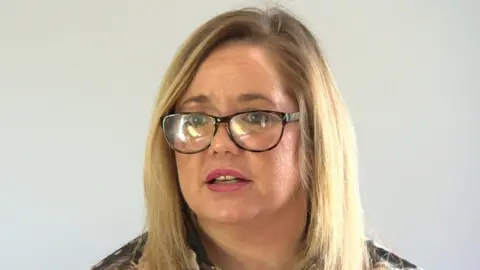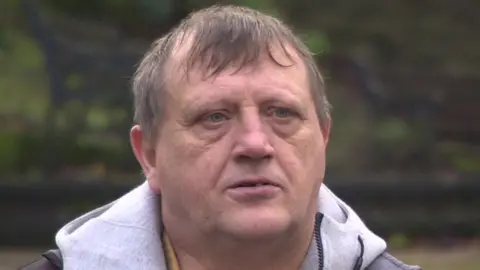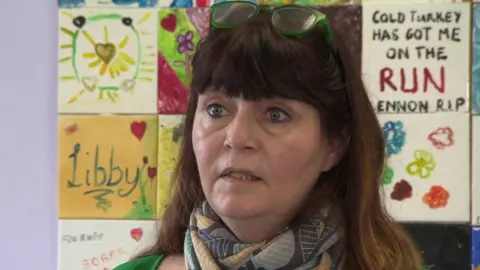Alcohol addiction: Trying to go sober without any funding
 BBC
BBCCarly Reed used to drink up to five bottles of wine a day, but she has checked into a clinic as she tries to go sober.
"I cried my eyes out when I came here," the 39-year-old says from the Manchester detox centre where she is receiving treatment.
"The first three days were killing me. I was vomiting, up all night and sweating."
But when Carly finishes going through withdrawal, she will have to return to her empty flat where she will finish her treatment in the community because she has been denied funding for free in-patient rehabilitation.
She is concerned that she will end up "sitting at home and have too many thoughts".
"Whereas when you're in rehab, you're controlled and you learn and they teach you and they look after you," she says.
"It does cost a lot of money but the way I am, I need it."
Alcohol and drug treatment in England is commissioned by local authorities with health funding from the government.
However free use of residential rehabilitation - where addicts stay in a monitored environment away from home - is usually only offered after community treatments.

Organisations which provide treatment say their funding has not kept up with demand and has been slashed nationally over the last five years.
"We've had a roughly 30% increase in demand for alcohol [addiction] use since the pandemic but the funding is still the same as it was before", says Gill Campbell, head of nursing at the Smithfield Centre where Carly is being treated.
She says they have cut beds from 22 to 14 due to uncertainty over their funding.
"It's been really challenging because we've got to look at who do we support and who do we prioritise."

- There are now 28 detox and in-patient centres in north-west England - which has some of the highest rates for alcohol consumption, hospital admissions and deaths in the country - compared to 39 in 2016
- However alcohol-related hospital admissions and deaths were rising nationally before the pandemic, and latest government figures show those trends have since "accelerated"
- More than £100m has been cut since alcohol rehabilitation services in England were reorganised in 2012, according to a study
- Drug and alcohol services lost about 30% of their budgets since 2013-14, when they were handed over to local authority control, researchers found

"The pandemic didn't help much. In fact it was the final nail in the coffin," says Paul Coop, whose drinking habits worsened after lockdown started.
A former bus driver, the 50-year-old says he and his partner were "drinking day in, day out, every day".
"It got to the point where we were borrowing money, robbing Peter to pay Paul, just so I could get my fix."
His partner was eventually taken to hospital for treatment, when she got Covid.
The experience prompted Paul to seek help for his addiction but he had to wait nine months to get a place in a detox centre because of waiting times and delays during the pandemic.
While everyone has a right to free treatment for addiction in England, his funding application was denied twice.
He was asked to do more work with his mentor to prove he was ready for treatment - because of how limited in-patient places were being prioritised - despite saying he was desperate to begin.

The alternative of paying for private treatment can set patients back several thousands of pounds so it is not an option available to many.
Ms Campbell says she does not believe people who are dependent on alcohol are prioritised in the same way as those with other serious health problems, adding: "We could do so much more if we were funded correctly.
"It would make such a huge impact, not just to those individuals but to whole communities if we could provide the right treatment to the right person in the right place."
She says she is "passionate" about providing free care, adding: "To see our service cutting here and to see other services shutting down, I'm really, really disappointed and despondent about it."

If you're affected by the issues in this story, you can find support from BBC Action Line.

A spokeswoman for the Department of Health and Social Care said the government was providing £533m of new funding over three years for drug and alcohol treatment in England.
She said this included "funding to increase the availability of inpatient detoxification beds".
"We have set up the Office for Health Improvement and Disparities to level up and address the long-standing health disparities that exist in many areas, including in relation to alcohol-related health harms."
Carly is now approaching nearly 30 days of being sober, while Paul has not had a drink for nine months and his partner has been abstinent for two years.
He is concerned that other people who could be denied free treatment or face delays "may give up and just carry on what they're doing".
As for his own situation, he says: "It's amazing. Good to be alive and, well, better."

Why not follow BBC North West on Facebook, Twitter and Instagram? You can also send story ideas to [email protected]
